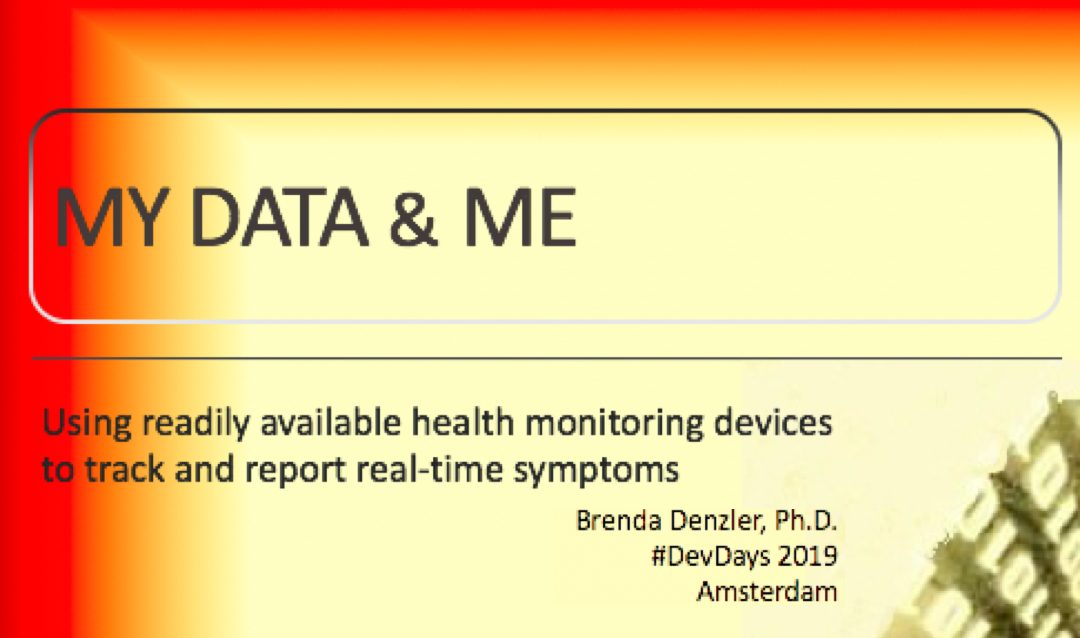SPM member Brenda Denzler had Inflammatory Breast Cancer (IBC), which was followed by years of intractable symptoms that her doctors couldn’t diagnose – all their tests kept saying she was “fine.” “But I live with this body,” she says, and she knew things weren’t fine. Today her case has transformed substantially because data she collected and organized – data not requested by her doctors, but recognized as valuable – has led to a likely diagnosis.
This fall Brenda entered her story in a competition for the “DevDays” (Developer Days) for the HL7 FHIR community. (More on that below.) She was chosen as one of the four finalists who won a stipend to help them attend the Patient Innovator Track at the event, in Amsterdam, which was held last week.
As fate would have it, she then developed two conditions that meant no airplanes: DVT (blood clot) and pulmonary embolism. Rats! But you know e-patients … unstoppable, she recorded her voice onto her slides, which the conference accepted and played for her. Here you go. (Email subscribers, if you can’t see the video, click here to play it on our YouTube channel.) It’s a pretty amazing 14 minute story.
More on dysautonomia
Last week USA Today published this about the disease: You look fine. Your doctor is stumped. But this disorder is leaving millions ‘a hot mess. The money quote:
“[Cleveland Clinic neurologist Robert] Wilson said that the illness often seems to strike people who have survived a previous health trauma, such as cancer treatment or an organ transplant. … The disease is like a fire and now you are living with the smoke damage. Dysautonomia is the smoke damage.”
Here’s the dysautonomia page at Cleveland Clinic.
Regular readers will recall Kristina Sheridan and her daughter Kate, who were speakers at our #SPM2018 conference. (Video here.) Kate had a severe case of Lyme, which was significantly complicated (as the harsh treatment wound down) by what turned out to also be dysautonomia, specifically the POTS variety (postural orthostatic tachycardia syndrome – the heart races when you stand up.)
The Sheridans were in Amsterdam too, as the Friday keynote speakers. Kate says quite early in Brenda’s talk she told her mom, “She’s got dysautonomia!”
More on FHIR and DevDays
If you’re not interested in health data technology, skip this.
The HL7® FHIR® (Fast Healthcare Interoperable Resources) standard is an open software standard (not a product) that’s been in development for over six years. (See my posts this summer about FHIR on Tincture, especially HL7 makes it official: #FHIR exists to serve patient needs. That’s in extreme contrast to the usual health IT systems that are oriented around billing.)
I first learned about FHIR at a conference in Australia five years ago, and since mid-2018 I’ve been barging in :-) to both get involved in the work (all volunteer) and encourage them to actively incorporate the voices of patients – not just “professional patients” who run organizations, but what I call “ASPs” – “actual sick people,” the individuals themselves.
They’re doing it.
And they move pretty quick – they have a semi-annual DevDays (FHIR Developer Days) event, which includes a student track and a startup track, in addition to the main sessions; at June DevDays I proposed the idea of a patient innovator track, and they announced one in September. Entries were accepted and the four finalists were announced four weeks ago.
Many thanks to the Dutch Ministry of Health for sponsoring the patient innovator track. I mean, how long have we been waiting for this??







Recent Comments